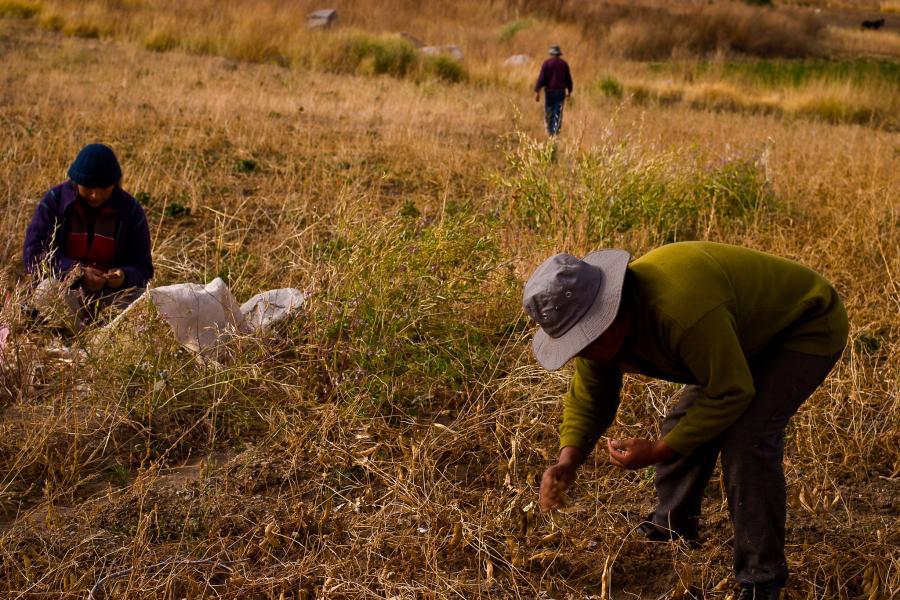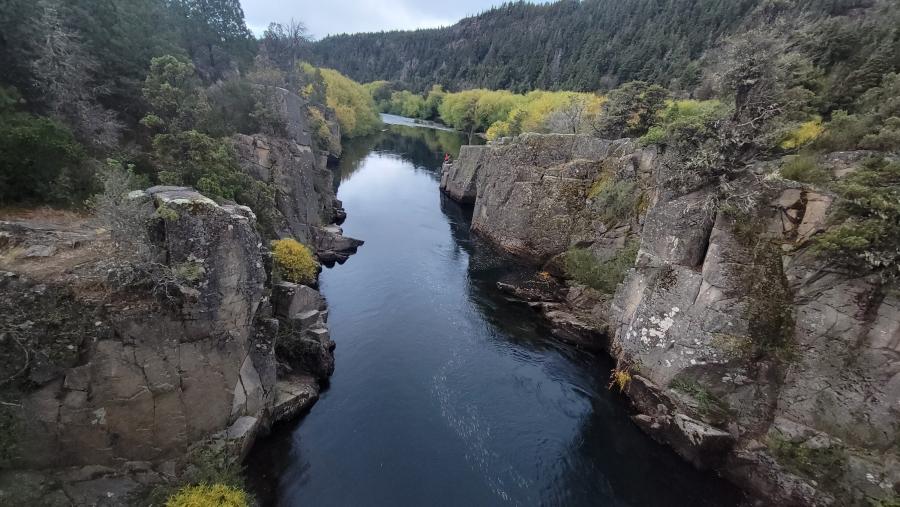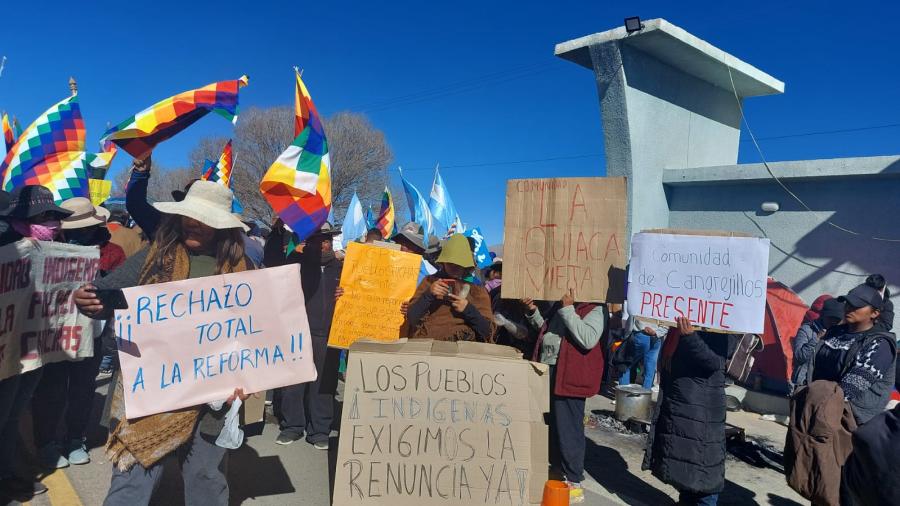
By Candela Palacios (CS Staff)
On September 6-8, 2024, the Fifth Latin American Water Summit for the Peoples was held in El Moreno, in the province of Jujuy, Argentina. This event was organized by the Indigenous communities grouped within the Salinas Grandes and Laguna de Guayatayoc Basin, the Comisión Promotora de Pueblos Indígenas de Jujuy (Commission for the Promotion of Indigenous Peoples of Jujuy), and the Tercer Malón de la Paz (Third Peace Raid). The Angosto El Perchel Community, which took part in the planning, is a Cultural Survival Keepers of the Earth Fund grant partner.
The Latin American Water Summits for the Peoples were started in 2018 in the province of Catamarca, also in Argentina, by the Assembly of Catamarcan Peoples in Resistance and Self-Determination (PUCARA) to bring together local communities and Indigenous Peoples living in resistance to mining and whose water sources are impacted by this type of extractivism.
The event involved three days of intense debate and presentations by those impacted, from Indigenous communities directly affected by mining in Argentina, Chile, and Peru to people outside the communities with scientific, legal, and academic training who are supporting the communities from their different fields of knowledge. The process culminated in the drafting of a Declaration that sought to raise the current state of affairs, denouncing the violation of multiple rights and offering a series of solutions for the future.
Regardless of whether it is open-pit mining, underground mining, drilling wells or brine evaporation, in all cases, this activity results in high consumption of water and water contamination. Keeping this issue in mind is of vital importance since many mining companies try to "sell" their activity as "clean" or "green", but hide, or even in some cases, admit not knowing, the impact and scope of their activity on the environment and its inhabitants.
The province of Jujuy, neighboring provinces such as Salta and Catamarca, and large portions of neighboring countries such as Chile, Bolivia, and Peru are included within a geographical area internationally known as "the Lithium Triangle." In the last decades, this region has been deemed as an area with the largest lithium reserves in the world. Given the importance of this mineral for the production of batteries, various industries involved in the so-called "green energy transition," mainly electric vehicle manufacturers, have set their sights on this region.
Although we are currently witnessing an exponential increase in the exploration and exploitation of lithium, the communities in the region have been facing the serious environmental consequences of mining, as well as State and private persecution, for decades. This experience of rights violations, mistreatment, persecution, and environmental damage leads the affected communities to seek to alert others near which mining plants are trying to be installed or have recently been installed about what consequences they will face.
During the summit, two scientists who were working alongside one of the organizing communities in their legal claims presented a useful measure to understand some of these consequences. This measure is the concept of water balance or budget, which evaluates the amount of water that naturally enters (mainly through precipitation) and leaves (mainly through evaporation) the water sources of a given region. In the case of the Puna region, an ecoregion that includes the Lithium Triangle, due to the scarce precipitation, the amount of water that enters the system is naturally scarce, while due to the number of sunny days, a lot of water evaporates. The installation of lithium extraction plants by brine evaporation, the most common type in this region, implies a water consumption that breaks this delicate water balance, causing irreversible environmental consequences, such as the drying up of rivers. The most important direct consequence is to turn the affected territory into what the mining companies themselves call "sacrifice zones," which become unviable for plant, animal, and, therefore, human life. Maria Patzi, or Alliwaitaillasa (in Quechua), an Elder from one of the communities stated, “Now they say they are going to privatize, they say there is going to be a supposed owner of the water... it can't be, water belongs to humanity. It is life, they cannot privatize it.”
But even more seriously, evaporative mining has disastrous environmental impacts on a much larger scale. Indigenous Peoples around the world recognize the interconnection between the natural and human world in ways that the western worldview does not perceive and insists on separating. Scientifically, there is still a strong lack of knowledge about the functioning of aquifers, the great underground water reserves. However, recent studies show that changes in an aquifer can have consequences in very distant regions, with environments that at first sight seem to be independent of the affected area. Patzi stated, “In our culture the land is not sold, it is not negotiated, it is the Mother, as we say. You are not going to sell the Mother. Never. You have to take care of it, protect it, for those who come after you.”
It is difficult to measure the environmental impact that the depletion of these large reserves can have on regions much wider than those considered in environmental impact studies, and even on a planetary level. While some mining companies and governments acknowledge the lack of reliable and up-to-date information on the environmental impacts of the mining they encourage, this does not curb the ambition and power of mining companies. Governments and corporations continue to violate the rights of local communities, especially those of Indigenous Peoples, rights that are recognized in international norms and, in the case of Argentina, that have been ratified in national laws for several decades. The communities are carrying out various strategies to ensure that these rights, such as the right to Free, Prior and Informed Consent, are fulfilled in order to defend their territories.
It is important to highlight the growing role of Indigenous communities in the development of these summits. This was the first time that the event was held not only in the ancestral territory of Indigenous Peoples but also that Indigenous communities and organizations planned and coordinated the event. During the event, various traditional ceremonies were performed in order to entrust the development of the meeting to the natural forces that they sought to protect and to sensitize the attendees of diverse origins to the perspectives of the Indigenous Peoples of the region about the relationship that we have and must safeguard with Water, Nature, and Life.
In the dialogs and presentations, the importance of responding to the extractivist model of western capitalism with other proposals for productive and consumption models was emphasized as strategies that lead the way to action and not only to resistance. For this, it is essential to promote spaces for the exchange of knowledge and experiences of struggle, resistance and alternative ways of life, such as this summit. The need to prioritize the centering of Indigenous Peoples in these meetings was also reflected in the resolution to modify the summit's name, changing its name from its next iteration to the Plurinational Water Summit for the Peoples of Abya Yala.
When asked what she would like to see as a result of this meeting, Patzi replied, “Awareness, that people gain awareness, that water is life. We depend on it to exist, to continue producing our plants, our products, food, and all those things. For us, Mother Earth is life, and water is the blood of Mother Earth.”
Documentaries produced in collaboration with the Indigenous communities of the region were also screened. "Before Lithium" highlights the context in which Indigenous communities are facing the expansion of lithium mining, as well as the perspective that the mining companies seek to install about the benefits of their activity. It also portrays the lack of knowledge of the final consumers of electric vehicles in Europe about the reality of the exploitation.
Another important aspect in relation to the prominence of Indigenous communities and perspectives in the event was the strong positive impact of the participation of the Environmental Unit (UMA) of the Council of Atacameño Peoples (CPA) of Chile. The experiences of the UMA in the construction of both scientific and Traditional Knowledge, in efforts led by professionals from the communities themselves, were recognized by the attendees as a great tool for denouncing environmental damage to corporations and governments and as evidence to be used in legal instances. The recognition of the great work of the CPA was also condensed in a vote decision to hold the next summit in San Pedro de Atacama, part of the Atacameño territory.
Indigenous ancestral knowledge and ways of seeing the world safeguard the seeds with which to cultivate solutions to the civilizational crisis we are going through and its most pressing consequences: climate change, loss of biodiversity, and of sacred common goods, such as Water. Cultural Survival is deeply grateful to the organizations and communities organizing this event for the opportunity to participate in this vital exchange.
--
|
|



